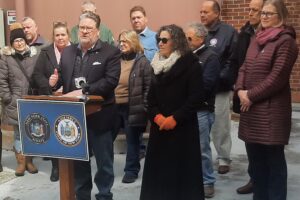
Former First Lady Rosalynn Carter once said there are only four kinds of people in the world: those who have been caregivers, those who are caregivers, those who will be caregivers and those who need caregivers.
The growing caregiving crisis in the U.S. has put a significant burden on many families. While the demand for caregiving services has risen, the shortage of caregivers has impacted approximately 20 percent of community-living adults who need care but are unable to find paid or family help.
Contributing factors such as aging baby boomers and longer life expectancy will result in significant growth of the older population in the U.S. in the next 25 years. By 2030, about one in five people in the U.S. will be over 65 years old.
Currently, about 1.4 million Americans aged 65 and over live in nursing homes, four times as many receive care at home, and significant numbers of frail older people go completely without the help they need.
While demand for caregiving and long-term care services is increasing, the supply of caregiver services is increasingly tenuous. Long-term care providers are reporting unprecedented turnover and vacancy rates of paid direct care workers. The available workforce of caregiving paraprofessionals is often inadequately trained and underpaid.
Moreover, social and demographic trends, including more women in the workforce, an increase of dual-earner households, as well as families with fewer children, have diminished the supply of family caregivers. Especially hard-hit by these trends is the so-called “sandwich generation,” with the responsibility of raising children while caring for their aging parents. Many family caregivers work full-time and face a triple responsibility.
Committed to closing this “care gap,” the Center for Long-Term Care at New York Medical College (NYMC) works towards improving the quality of long-term care for all Americans by using a multidisciplinary approach, engaging in research, education and public policy development, as well as general health care needs and caregiving across the lifespan. The issues of maintaining health and independence with aging are central to its mission. However, long-term care is not just about older people. Younger populations, too, face chronic conditions and disabilities. The Center focuses on not only those who need care, but also on those who provide it, including informal family caregivers and paid paraprofessionals.
The Center works closely with Doctor of Public Health (Dr.P.H.) and Master of Public Health (M.P.H.) students in NYMC’s School of Health Sciences and Practice (SHSP) Department of Public Health. Examples of research on caregivers conducted by doctoral students include incidence of falls, dental health and frequency of mental distress. Other Dr.P.H. and M.P.H. students have completed internships or practicums on projects related to aging or caregiving, such as assisting with focus group interviews, creating a repository of state-added questions and topics for a national surveillance system and working with nonprofit organizations to provide job training to populations with intellectual or developmental disabilities.
For more information on the Center for Long-Term Care at NYMC, please visit www.nymc.edu/center-for-long-term-care. To learn more about public health programs, including the new M.P.H. Generalist program slated to begin in spring 2023, contact the NYMC SHSP Office of Admissions at www.nymc.edu/shsp. Graduate degrees and certificates are offered in person and online.
Kenneth A. Knapp, Ph.D., interim vice chair of the Department of Public Health and assistant professor of health policy and management, is the director of the Center for Long-Term Care and of the Dr.P.H. Program in the School of Health Sciences and Practice at NYMC.







The Federal Deficit Reduction Act provided for every state to have a Partnership program to provide asset protection from Medicaid for those who buy qualified long term care insurance policies – partnershipforlongtermcare – yet most won’t buy insurance thinking it’s too expensive, but $90,000+ a year out of pocket is much more costly.